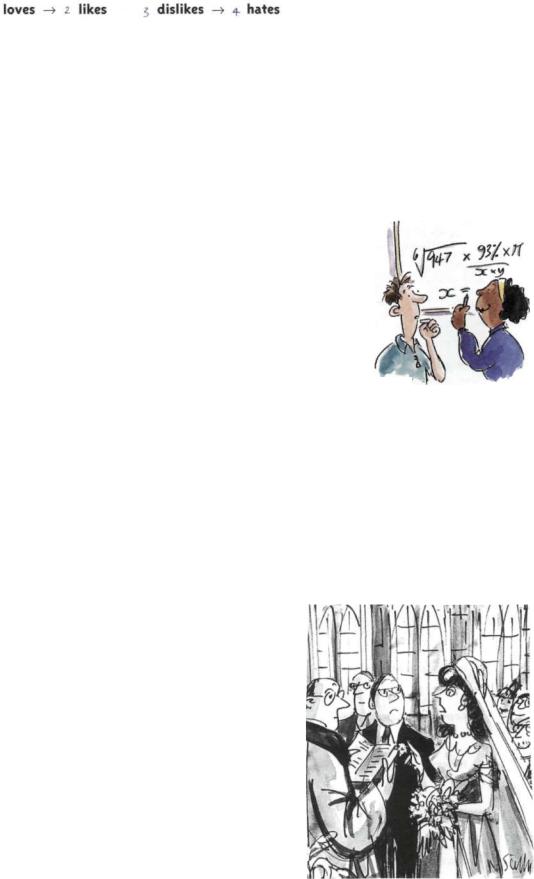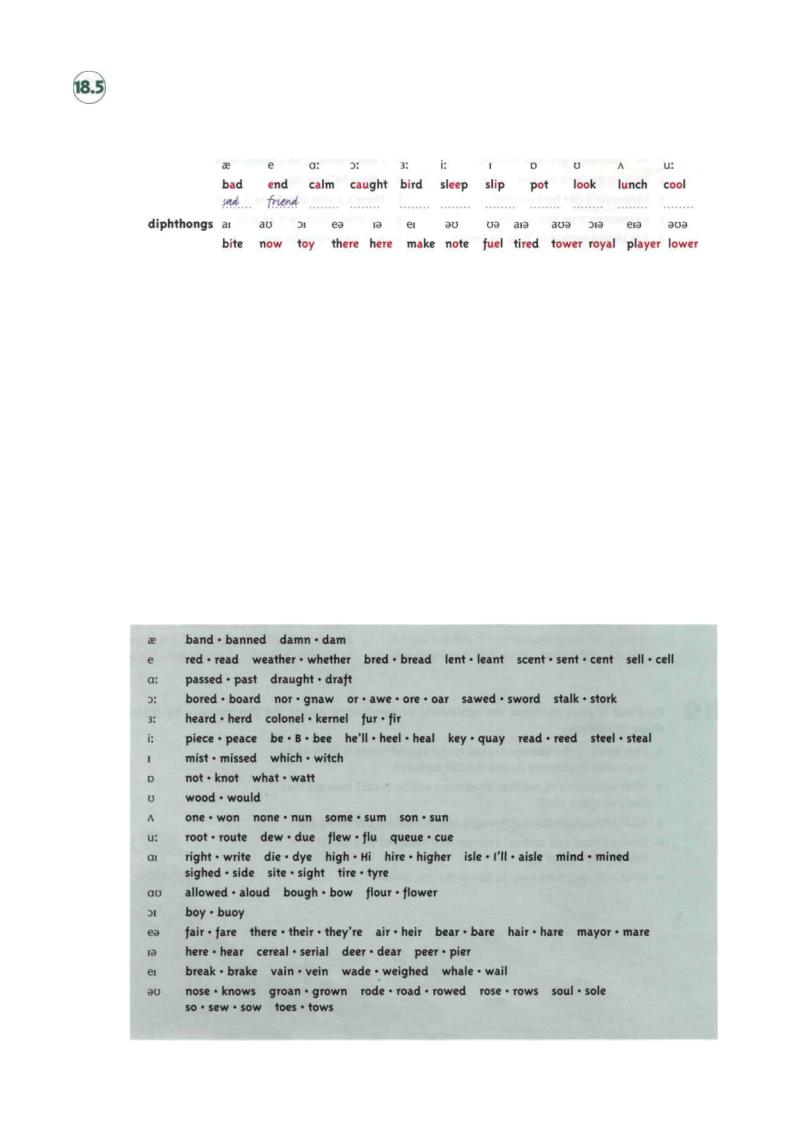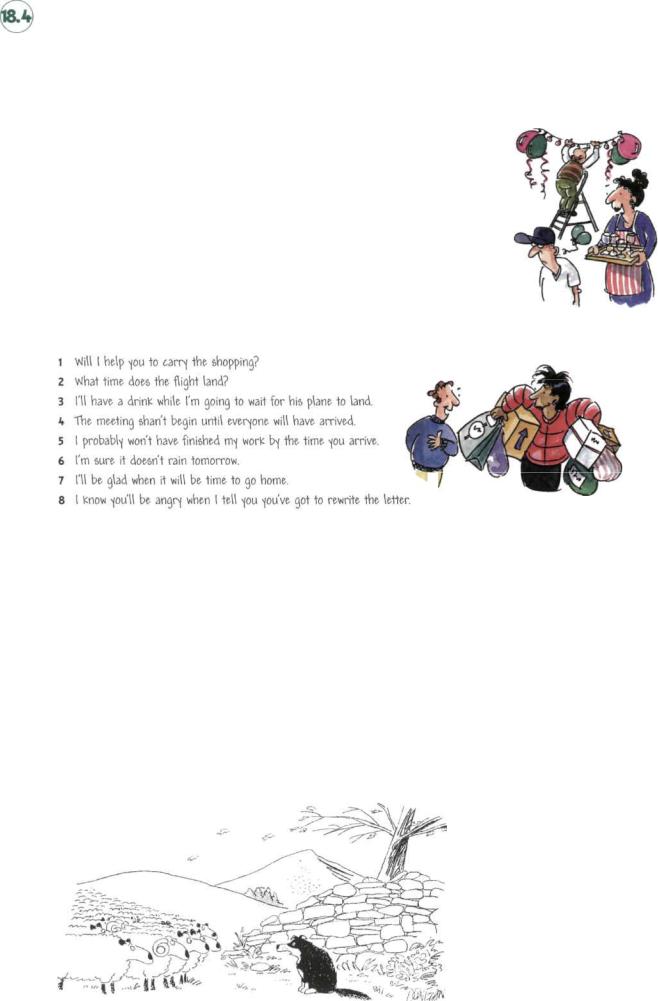
Four weddings and . . .
Listening and Creative writing
1 You'll hear Karen, Michael, Ishia and Tim describing weddings they have attended. Match the names of the speakers to the points they made.
Write K, M, I or T beside the comments - or N if nobody mentioned a point.
1Everyone gave the newly-weds money.
2The best man wore a black suit.
3The live band was terrible.
4The reception was not much fun.
5The speaker's brother was dressed like the other guests.
6The wedding ceremony is not as important as the reception.
7The wedding took place in Turkey.
8There was a civil ceremony, not a religious one.
2Discuss these questions:
•What aspects of each wedding was different from your own experiences of weddings in your country?
•Which of the weddings sounded the most fun?
3Find out if your partners have ever attended a wedding and get them to describe it to you. Find out how the guests at the wedding felt - was everyone happy?
1Read the first paragraph of this account of a wedding on the left. What improvements have been made in the second version?
2 Look at the second and third paragraphs and suggest how they can be improved. A Then write a fourth, concluding paragraph.
The party itself was wonderful. Everyone was there: all the couple's friends from work, the people they knew at college and even some old school friends had been invited. It started at 8pm and went on till midnight. At exactly 10pm the band stopped playing and the couple cut the wedding cake. We all got a piece.
Then it was time for the speeches. The bridegroom was awfully nervous and his speech was disappointing, but then the best man made his speech and it was hilarious. He told us all about the groom's childhood and student days because he was his best friend. Then he got the giggles and couldn't go on, but everyone clapped for ages.
C Write an |
account (about 250 words) of either: |
|
a wedding in your own country that you have attended |
OR |
a family event that you have participated in (a birthday |
|
celebration, anniversary party, christening, funeral, etc.) |
|
|
When you're writing an account of your personal experiences, in real life you 11 tell
the truth - but in an exam you can use your imagination and invent fictional experiences. Ш real life too an account can be more interesting if you exaggerate a little, focus on
the most exciting or amusing events and don't mention the routine or boring things that happened.

New Cambridge Advanced English
Head over heels . . .
Idioms and collocations
Number these expressions, grading them according to their meanings:
HE/SHE . .. |
|
|
fancies |
can't bear |
is crazy about |
is devoted to |
can't live without |
doesn't think much of |
is indifferent to |
is fond of |
is keen on |
thinks the world of |
is incompatible with |
detests |
doesn't get on with |
loathes |
gets on really well with |
can't stand the sight of |
is attracted to |
has gone off |
has fallen out with |
is head over heels in love with |
adores |
|
|
. . . HER/HIM |
Fill the gaps in these sentences with a suitable form of head, brain or mind.
1 |
She's very good at maths - she has a good |
|
for figures. |
2 |
They were in two |
whether to get married. |
|
3 |
If there's an emergency, don't panic - try to keep your |
|
4 |
We couldn't solve the problem, but suddenly I had a |
wave. |
5 |
I'll spin a coin to see - do you want to call |
|
or tails? |
6 That's too difficult for me to follow - it's over my |
|
7 |
He can't climb a ladder because he has no |
|
for heights. |
8 |
They were |
over heels in love. |
|
|
9 |
A good book can help to take your |
off your troubles. |
10 |
When it comes to politics, I try to keep an open |
|
|
11 |
I'm sorry I didn't make that phone call, it slipped my |
m . |
12 |
If there's a problem to solve, two |
are better than one. |
Fill these gaps with a suitable form of face, eye, nose, or ear.
1 |
I can't tell you exactly what to do - you'll have to play it by |
2 |
I tried to catch the waiter's |
|
but he didn't look my way. |
3 |
I have to go away for a while, can you keep an |
on them for me? |
4 |
They normally see |
to |
|
but in this case they disagreed. |
5During the wedding someone started giggling and I couldn't keep a straight
6When they said they'd got engaged I couldn't believe my
7She's such a snob - she looks down her at everyone.
8Don't bother to tell me how to get there - I'll follow my
9You can't support both sides at once - don't be so
|
two- |
. |
|
10 |
If you admit to making such a serious mistake you may |
|
lose |
. |
|
11 |
He knew the risks and went into it with his |
|
|
|
open. |
|
12 |
Anything you say to them goes in one |
and |
|
out the other. |
|
|
"Forsake all others! That's a bit drastic, isn't it?'
1Ask your partners:
•what kinds of creatures are popular as pets among their friends
•why they believe it's important to protect the environment
2Note down FIVE environmental issues that are in the news at the moment.
Identify these animals and plants and make sure you can both spell and pronounce their names correctly. Then add two more species to each group.
1 Mammals
2 Birds
3 Insects and invertebrates
4 Reptiles and amphibians
5 Flowers
6 Trees and plants
7 Sea creatures
New Cambridge Advanced English
One of you should look at Activity 5, the other at 24. When you've read the short passage there, tell your partner about it and then discuss these questions:
•Whose situation would be worse: Cregor's or Eric's? Why?
•What do you think might have happened next in each story?
•If you could be an animal, what kind of animal would you most like to be and why?
You'll hear ten extracts from conversations - the last word or phrase of each clip is not audible. Write down the missing word or phrase.
Compound words
Word study
1 Compound nouns
There are no hard-and-fast rules about whether the two elements of a compound noun are written as one word or two words.
Look at these examples:
As a rule of thumb, the most common short compound nouns tend to be written as single words. If you're unsure you should consult an up-to- date dictionary. If in doubt, write a compound noun as two words, without a hyphen.
one word |
blackbird bookcase bookseller breakdown classroom girlfriend greenhouse |
|
headache lighthouse railway raincoat rainforest sightseeing wildlife |
|
two words |
breakdown service |
bus driver bus station |
bus stop |
|
|
greenhouse effect |
headache tablets |
power station railway station |
|
|
sightseeing coach |
station manager |
toy shop wildlife reserve |
|
|
hyphen |
do-it-yourself great-grandmother |
make-up |
two-thirds |
|
|
|
|
|
|
|
|
|
2Match each of the words in the first group with words in the second group to form compound nouns:
acid rain chain reaction coal mine coffee brake
acid |
\/ |
chain |
\/ |
coal \/ coffee \/ charter |
committee |
computer drinking |
flight |
food |
holiday |
language meeting ozone palm |
pet |
post |
pressure |
progress |
safety |
|
steering |
telephone |
traffic typing |
video |
waiting |
washing |
wastepaper |
water |
|
window |
zoo |
|
|
|
|
|
|
|
|
|
|
|
|
|
|
|
|
|
|
attendant basket |
break \/ |
brochure |
call |
chain |
cleaner |
flight |
food group keeper |
layer |
lights |
machine meeting mine \/ office |
paper |
point precautions |
pressure |
rain |
\/ |
reaction |
\/ recorder |
room |
screen |
teacher |
test |
|
tree |
water |
wheel |
1 Compound adjectives
Most compound adjectives are written with a hyphen. Look at these examples:
user-friendly well-known self-satisfied self-employed state-of-the-art second-hand up-to-date
But some are written as one word:
windproof suntanned breathtaking homesick
2Match each of the words in the first group with words in the second group to form compound adjectives.
trnids-traded eUtty-frw -cntr-vу'-efficient ^Munh^neMr-fruendiM
broad У |
duty У |
energy У |
environment У good |
green hard hard heart home |
ill loose |
narrow |
quick record self short time |
under user |
well |
well |
behaved |
breaking |
broken |
consuming |
efficient У |
employed |
fingered |
fitting free У |
friendly У |
friendly |
hearted |
informed |
looking made meaning minded У minded paid |
staffed witted working
Protecting the environment
Reading and Listening
1 Choose the best phrase given opposite to fit in each of the numbered gaps. Two of the phrases don't fit at all.
If we condense this inconceivable time span into an understandable concept, we can liken Earth to a person of 46 years of age.
Nothing is known about the first seven years of this person's life, and whilst only scattered information exists about the middle span, we know that only at the age of 42 did the Earth begin to flower.
Dinosaurs and the great reptiles,
when the planet was 45. Mammals arrived only 8 months ago; in the middle of last week manlike apes
2 , and at the weekend the last ice age enveloped the Earth.
Against all odds, Greenpeace has 6 |
to the |
attention of caring people. Terrible abuses to the |
|
environment, often carried out in remote places or far |
out to sea have 7 |
and in the press. |
|
Greenpeace began with a protest voyage into a |
|
nuclear test zone. The test was disrupted. Today, the site at Amchitka in the Aleutian Islands is a bird sanctuary.
Then Greenpeace sent its tiny inflatable boats to protect the whales. They took up position between the harpoons and the fleeing whales. Today, commercial whaling is banned.
On the ice floes of Newfoundland, Greenpeace volunteers placed their bodies between the gaffs of the seal hunters and the helpless seal pups. The hunt
Modern Man has been around for four hours.
During the last hour Man 3 |
. The |
industrial revolution began a minute ago. |
During those sixty seconds of biological time, |
Modern Man k |
|
He has 5 |
, caused the extinction of |
500 species of animals, ransacked the planet for fuels and now stands like a brutish infant, gloating over this meteoric rise to ascendancy, on the brink of a war to end all wars and of effectively destroying this oasis of life in the solar system.
In the North Atlantic, Greenpeace drove its inflatables underneath falling barrels of radioactive waste. Now nuclear waste dumping at sea has been stopped.
In the North Sea, Greenpeace swimmers
9carrying chemical wastes. New laws to protect the North Sea have been promised.
Peaceful direct action by Greenpeace
10, which in turn has forced changes in the law to protect wildlife and to stop the pollution of the natural world.
|
|
|
|
New Cambridge Advanced English |
A |
appeared eight years ago |
c |
been headlined on television |
B |
brought the plight of the natural world |
H |
continued despite their efforts |
c |
did not appear until one year ago |
I |
discovered agriculture |
D |
evolved into ape-like men |
I |
has invoked the power of public opinion |
E |
has made a rubbish tip of Paradise |
K |
multiplied his numbers to plague proportions |
F |
turned back dump ships |
L |
was subsequently called off |
2Discuss your reactions to what you've read in the passages opposite.
You'll hear an interview with Cyril Littlewood, who runs the Young People's Trust for the Environment and Nature Conservation. Choose the best answer to questions 1-5.
1Why did the poachers show Cyril and his friends where to watch badgers? A They didn't want to trouble them.
B They wanted them to help them catch rabbits. C They didn't want to get caught.
D They were hungry.
2Why does Cyril run courses in Dorset?
A Local schools invite him to talk to the pupils. |
|
B |
So that pupils discover more about nature. |
|
C |
The scenery is beautiful. |
|
D To teach the pupils about the archaeology of the county. |
cyrilu«lew0°<i |
3Why are many schoolteachers pleased with the courses? A The pupils behave better than they do in school.
B The pupils start to take nature for granted. C They get a break from the classroom.
D The pupils learn more on Cyril's course than they do at school.
4What should you do when approaching giraffes?
ADon't get too close.
BDon't let them see you.
CLet them see you.
DTalk in a whisper.
5 What has been the problem with saving the tiger?
AMoney can't stop poachers killing tigers.
BNot enough money has been raised.
CThe money hasn't been spent on the right things.
DToo much money has been raised.
6-12 Fill each gap in this summary with a number:
Every minute 6 |
|
babies are born (= 7 |
per day). |
Net population growth: 8 |
per day (= 9 |
million per year). |
10 |
% of the Earth is covered by the oceans, lt |
% is land. |
Only t2 |
% of the |
land surface is available for agriculture to feed the world. |
13 In one word, how does Cyril feel about the future? 13
Ask your partners:
•how they feel about the future of our planet
•how 'green' they are
•what they do to protect the environment
•what they recycle
Write a report about what is being done to protect the environment in your country or region - and recommending what more should be done (about 250 words).
The future and degrees of certainty
Grammar
Discuss the difference in meaning between these sentences:
1/'// write to her tomorrow.
I'm going to write to her tomorrow. I was going to write to her tomorrow. I'll be writing to her tomorrow.
2Are we going to make the first move} Shall we make the first move)
3I'm just going to phone them now. I'm about to phone them now.
I was just about to phone them now.
4Will you help us later)
Are you going to help us later)
Will you be helping us later)
Won't you be helping us later)
I will write to her tomorrow. I'm writing to her tomorrow.
I'll have written to her tomorrow. I'll have to write to her tomorrow.
Do we make the first move) Will we make the first move)
I'm phoning them now.
I've phoned them now.
I'll phone them now.
Are you helping us later)
Were you going to help us later) Won't you help us later)
Aren't you going to help us later)
Spot the errors in these sentences - some contain NO errors.
Fill the gaps in these sentences, using the verbs below. All the sentences refer to FUTURE events.
1 Fifty hectares of jungle |
during the next minute. |
2Next year another 250,000 square kilometres of tropical rainforest
3Soon most of the world's jungles
4 |
Toxic wastes |
|
in the oceans more and more in the future. |
5 |
A complete, permanent ban on whaling |
eventually. |
6 |
Many species of plants and animals |
|
extinct next year. |
7 |
The use of pesticides |
to the evolution of chemical-resistant pests. |
8 |
Pollution |
still |
|
damage to the environment in the 21st century. |
9 |
Governments |
|
more notice of environmental pressure groups. |
10 |
Energy conservation measures |
into effect. |
|
|
|
|
|
|
|
accumulate |
become |
cause come |
cut down |
devastate destroy impose lead take |
"Negotiate? What is
New Cambridge Advanced English
Match each sentence in the first column with one in the second column that means the same.
1I don't think he'll be here on time.
2He's very unlikely to be on time.
3I'm sure he'll be late.
4He'll probably get here on time.
5He may get here on time.
6I know he'll get here on time.
7I expect he'll be here on time.
8I'm almost certain he'll be on time.
aHe can't possibly arrive on time.
bI doubt if he'll be late.
cHe's not going to be late.
dI don't know if he's going to be late.
eI think he'll be late.
fThere's a slim chance he'll be late.
gI'm pretty sure he'll be late.
hHe's unlikely to be late.
This chart shows various people's predictions about the effects of global warming. Decide where the sentences in red below fit into chart, according to their meanings.
It looks as if it will get warmer.
I'm fairly sure it won't get warmer. I doubt if it will get warmer.
It's going to get warmer.
In all probability it will get warmer. I'm absolutely sure it will get warmer.
I wouldn't be surprised if it got warmer. I suppose it might get warmer.
There's not much chance that it will get warmer. There's a very good chance that it will get warmer.
I bet it will get warmer.
I guess it might get warmer.
I'd be surprised if it got warmer. It's likely to get warmer.
Of course it won't get warmer. It's sure to get warmer.
It's bound to get warmer.
I don't think it will get warmer.
There's no likelihood that it will get warmer. In all probability it's going to get a great deal warmer.
Find out if your partners are optimistic or pessimistic about the 21st century by discussing
these questions:
•How much of the damage caused to the natural world is likely to be controlled or reversed during the 21st century?
•What scientific and medical discoveries will be made? How are they likely to affect YOU?
•What technological breakthroughs and inventions will be made?
•What political and cultural changes will there be? How might these events affect you?
•What will your OWN lives be like in the 21st century?

Spelling and pronunciation 2 — Vowels |
Although there are only |
|
|
five vowels in the |
|
|
Pronunciation and Word study |
5 |
^ |
^ |
|
sounds in English. |
|
|
Write down another word that RHYMES with each of the words below: |
|
|
|
vowels |
|
|
|
1 Remember that the weak vowel sounds / a / and / i / occur in unstressed syllables. Look at these examples and listen to the recording.
This kind of thing happens again and again. |
5is kaind av Gin, haepanz agen and agen |
All of us thought it was a pretty good party. |
ail av as Gait it waz a pnti gud paiti |
2Underline the unstressed weak vowels in these sentences - imagine they're spoken at normal conversational speed. Then listen to the recording to check.
1 We all enjoyed your talk very much - the subject was very interesting. 2 The damage caused to the environment by industry is often overlooked.
3 Against all odds, Greenpeace has brought the plight of the natural world to the attention of caring people.
Look at these words that are pronounced the same but spelt differently. Take it in turns to explain the differences in meaning between them, like this:
A BAND is a group of musicians.
'DAMN!' is what you might say if you're annoyed.
If a film is BANNED it can't be shown.
A DAM holds back the water in a lake or reservoir.
New Cambridge Advanced English
Put the words in each group into pairs, according to the way the vowels in red are
pronounced. Look at the examples first:
Keep, hold, stand and turn
Verbs and idioms
Fill the gaps with the appropriate form of keep, hold, stand or turn.
1The children were misbehaving, but their uncle a blind eye to it.
2 They had to |
back before reaching the summit of |
the mountain. |
|
3If you can't do it on Friday, the work can be over till next week.
4 |
Make yourself at home — there's no need to |
on ceremony. |
5 |
If you want to succeed in our office, you have to |
in with the boss |
6 |
Everyone else was against him, so we decided to |
up for him. |
7 |
The college |
a record of every student's attendance. |
8 |
Concorde |
the world record for the fastest round-the-world flight. |
9 |
While on holiday I always |
a diary to help me to remember it later. |
10 |
He's feeling lonely and upset, will you be able to |
him company? |
11 The day he met Maria was a |
point in his life. |
12 We were disappointed when they |
down our offer. |
13 |
I've been trying to get |
|
of her on the phone, but there's no answer |
14 |
it! |
It's not time |
to start |
yet. |
|
15 I knew the bad news would upset them, so I |
it back from them. |
16 |
Bob is Mrs Reed's assistant: he |
in for her when she's on |
|
holiday. If he's away then someone else has to |
the fort. |
17 |
In an emergency, try to |
|
your head - i.e. don't panic. |
18 She can do fantastic somersaults and she can even |
on |
|
her head. |
|
|
|
19 |
If you really want to do that, I won't |
|
in your way. |
20 |
This new fabric can |
up to very heavy wear. |











